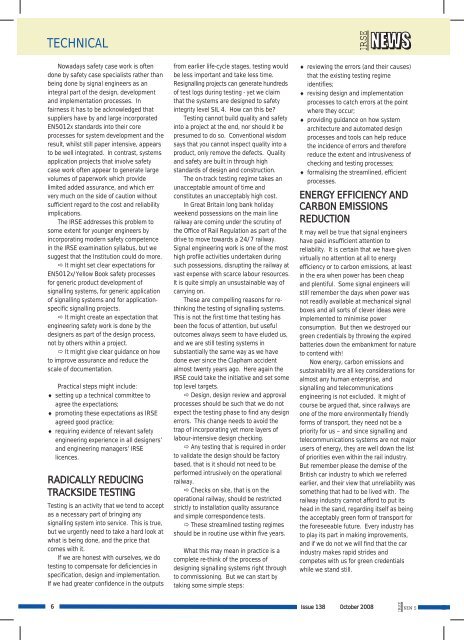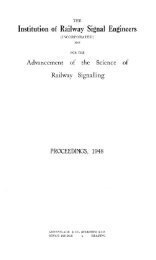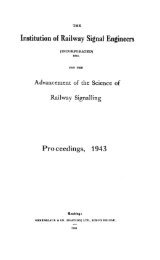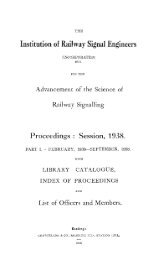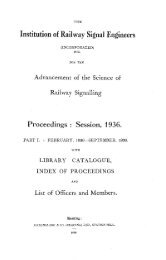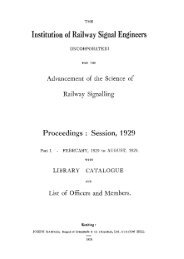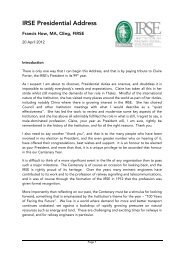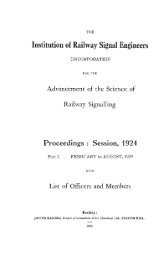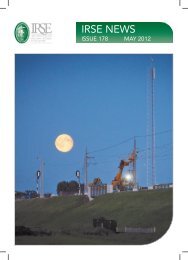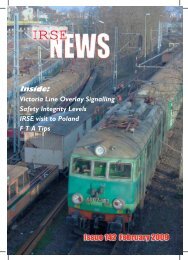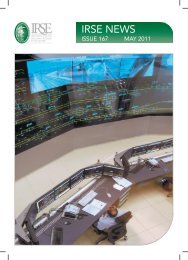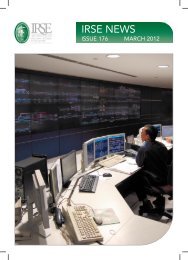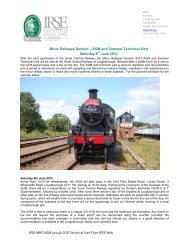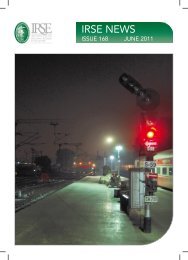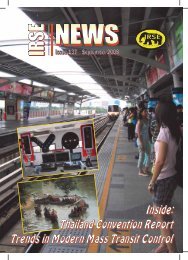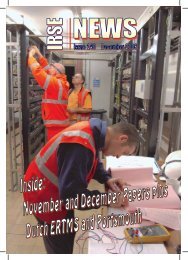IRSE News 138 Oct 08.pdf
IRSE News 138 Oct 08.pdf
IRSE News 138 Oct 08.pdf
You also want an ePaper? Increase the reach of your titles
YUMPU automatically turns print PDFs into web optimized ePapers that Google loves.
TECHNICAL<br />
<strong>IRSE</strong><br />
Nowadays safety case work is often<br />
done by safety case specialists rather than<br />
being done by signal engineers as an<br />
integral part of the design, development<br />
and implementation processes. In<br />
fairness it has to be acknowledged that<br />
suppliers have by and large incorporated<br />
EN5012x standards into their core<br />
processes for system development and the<br />
result, whilst still paper intensive, appears<br />
to be well integrated. In contrast, systems<br />
application projects that involve safety<br />
case work often appear to generate large<br />
volumes of paperwork which provide<br />
limited added assurance, and which err<br />
very much on the side of caution without<br />
sufficient regard to the cost and reliability<br />
implications.<br />
The <strong>IRSE</strong> addresses this problem to<br />
some extent for younger engineers by<br />
incorporating modern safety competence<br />
in the <strong>IRSE</strong> examination syllabus, but we<br />
suggest that the Institution could do more.<br />
It might set clear expectations for<br />
EN5012x/Yellow Book safety processes<br />
for generic product development of<br />
signalling systems, for generic application<br />
of signalling systems and for applicationspecific<br />
signalling projects.<br />
It might create an expectation that<br />
engineering safety work is done by the<br />
designers as part of the design process,<br />
not by others within a project.<br />
It might give clear guidance on how<br />
to improve assurance and reduce the<br />
scale of documentation.<br />
Practical steps might include:<br />
setting up a technical committee to<br />
agree the expectations;<br />
promoting these expectations as <strong>IRSE</strong><br />
agreed good practice;<br />
requiring evidence of relevant safety<br />
engineering experience in all designers’<br />
and engineering managers’ <strong>IRSE</strong><br />
licences.<br />
RADICALLY REDUCING<br />
TRACKSIDE TESTING<br />
Testing is an activity that we tend to accept<br />
as a necessary part of bringing any<br />
signalling system into service. This is true,<br />
but we urgently need to take a hard look at<br />
what is being done, and the price that<br />
comes with it.<br />
If we are honest with ourselves, we do<br />
testing to compensate for deficiencies in<br />
specification, design and implementation.<br />
If we had greater confidence in the outputs<br />
from earlier life-cycle stages, testing would<br />
be less important and take less time.<br />
Resignalling projects can generate hundreds<br />
of test logs during testing - yet we claim<br />
that the systems are designed to safety<br />
integrity level SIL 4. How can this be?<br />
Testing cannot build quality and safety<br />
into a project at the end, nor should it be<br />
presumed to do so. Conventional wisdom<br />
says that you cannot inspect quality into a<br />
product, only remove the defects. Quality<br />
and safety are built in through high<br />
standards of design and construction.<br />
The on-track testing regime takes an<br />
unacceptable amount of time and<br />
constitutes an unacceptably high cost.<br />
In Great Britain long bank holiday<br />
weekend possessions on the main line<br />
railway are coming under the scrutiny of<br />
the Office of Rail Regulation as part of the<br />
drive to move towards a 24/7 railway.<br />
Signal engineering work is one of the most<br />
high profile activities undertaken during<br />
such possessions, disrupting the railway at<br />
vast expense with scarce labour resources.<br />
It is quite simply an unsustainable way of<br />
carrying on.<br />
These are compelling reasons for rethinking<br />
the testing of signalling systems.<br />
This is not the first time that testing has<br />
been the focus of attention, but useful<br />
outcomes always seem to have eluded us,<br />
and we are still testing systems in<br />
substantially the same way as we have<br />
done ever since the Clapham accident<br />
almost twenty years ago. Here again the<br />
<strong>IRSE</strong> could take the initiative and set some<br />
top level targets.<br />
Design, design review and approval<br />
processes should be such that we do not<br />
expect the testing phase to find any design<br />
errors. This change needs to avoid the<br />
trap of incorporating yet more layers of<br />
labour-intensive design checking.<br />
Any testing that is required in order<br />
to validate the design should be factory<br />
based, that is it should not need to be<br />
performed intrusively on the operational<br />
railway.<br />
Checks on site, that is on the<br />
operational railway, should be restricted<br />
strictly to installation quality assurance<br />
and simple correspondence tests.<br />
These streamlined testing regimes<br />
should be in routine use within five years.<br />
What this may mean in practice is a<br />
complete re-think of the process of<br />
designing signalling systems right through<br />
to commissioning. But we can start by<br />
taking some simple steps:<br />
reviewing the errors (and their causes)<br />
that the existing testing regime<br />
identifies;<br />
revising design and implementation<br />
processes to catch errors at the point<br />
where they occur;<br />
providing guidance on how system<br />
architecture and automated design<br />
processes and tools can help reduce<br />
the incidence of errors and therefore<br />
reduce the extent and intrusiveness of<br />
checking and testing processes;<br />
formalising the streamlined, efficient<br />
processes.<br />
ENERGY EFFICIENCY AND<br />
CARBON EMISSIONS<br />
REDUCTION<br />
It may well be true that signal engineers<br />
have paid insufficient attention to<br />
reliability. It is certain that we have given<br />
virtually no attention at all to energy<br />
efficiency or to carbon emissions, at least<br />
in the era when power has been cheap<br />
and plentiful. Some signal engineers will<br />
still remember the days when power was<br />
not readily available at mechanical signal<br />
boxes and all sorts of clever ideas were<br />
implemented to minimise power<br />
consumption. But then we destroyed our<br />
green credentials by throwing the expired<br />
batteries down the embankment for nature<br />
to contend with!<br />
Now energy, carbon emissions and<br />
sustainability are all key considerations for<br />
almost any human enterprise, and<br />
signalling and telecommunications<br />
engineering is not excluded. It might of<br />
course be argued that, since railways are<br />
one of the more environmentally friendly<br />
forms of transport, they need not be a<br />
priority for us – and since signalling and<br />
telecommunications systems are not major<br />
users of energy, they are well down the list<br />
of priorities even within the rail industry.<br />
But remember please the demise of the<br />
British car industry to which we referred<br />
earlier, and their view that unreliability was<br />
something that had to be lived with. The<br />
railway industry cannot afford to put its<br />
head in the sand, regarding itself as being<br />
the acceptably green form of transport for<br />
the foreseeable future. Every industry has<br />
to play its part in making improvements,<br />
and if we do not we will find that the car<br />
industry makes rapid strides and<br />
competes with us for green credentials<br />
while we stand still.<br />
6<br />
Issue <strong>138</strong> <strong>Oct</strong>ober 2008<br />
<strong>IRSE</strong><br />
NEWS


